The avocado oil market is estimated to be valued at USD 363.9 million in 2025. It is projected to reach USD 651.6 million by 2035, registering a compound annual growth rate (CAGR) of 6.0% over the forecast period. The avocado oil market is projected to add an absolute dollar opportunity of USD 287.7 million over the forecast period.
This reflects a 1.77 times growth at a compound annual growth rate of 6.0%. The market evolution is expected to be shaped by rising health and wellness consciousness, increasing adoption of clean-label and organic products, and growing demand for healthy cooking oils, particularly where natural nutritional benefits and versatile applications are required.
By 2030, the market is likely to reach USD 501.7 million, accounting for USD 137.8 million in incremental value over the first half of the decade. The remaining USD 143.9 million is expected during the second half, suggesting a moderately back-loaded growth pattern. Product innovation in flavored oil sprays and butter blends is gaining traction due to avocado oil favorable nutritional profile and culinary versatility.
Companies such as Spectrum Organics Products LLC and La Tourangelle Inc. are advancing their competitive positions through investment in cold-pressing technologies and premium product formulations. Plant-based diet trends and natural cosmetic ingredient demands are supporting expansion into food service, retail, and personal care applications. Market performance will remain anchored in quality standards, processing innovation, and clean-label transparency benchmarks.
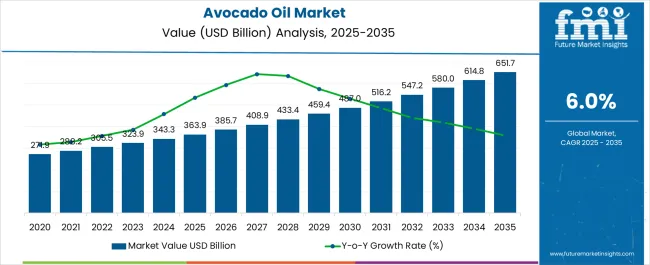
| Metric | Value |
|---|---|
| Estimated Size (2025E) | USD 363.9 million |
| Projected Value (2035F) | USD 651.6 million |
| CAGR (2025 - 2035) | 6.0% |
The market holds a niche yet growing share across its parent markets. Within the edible oil market, it accounts for 1.5% due to its premium nature. In the plant-based oils segment, it commands a 3.2% share, supported by rising health consciousness. It contributes nearly 2.8% to the organic food market and 2.5% to the functional food ingredients category. In natural personal care ingredients, avocado oil holds around 4.1% share, driven by its skin-nourishing benefits. Across the specialty and gourmet oils market, its share is close to 5.6%, owing to its use in high-end culinary applications and artisanal products.
The market is undergoing a strategic transformation driven by rising demand for premium, health-conscious, and versatile cooking solutions. Advanced extraction technologies using cold-pressing, membrane filtration, and innovative blending techniques have enhanced flavor profiles, nutritional retention, and product versatility, making avocado oil products viable alternatives to traditional cooking oils. Manufacturers are introducing specialized formulations, including flavored sprays and butter blends tailored for specific culinary applications, expanding their role beyond basic cooking oil functionality.
Strategic collaborations between avocado producers and food technology companies have accelerated innovation in product development and market penetration. Clean-label positioning and non-GMO transparency have widened consumer acceptance across diverse demographics, reshaping traditional oil sourcing patterns and forcing conventional oil suppliers to diversify their portfolios.
Avocado oil's exceptional nutritional profile, high smoke point, and versatile applications make it an attractive cooking oil for health-conscious consumers and food manufacturers seeking premium, clean-label ingredient solutions. Its rich monounsaturated fat content, antioxidant properties, and natural cold-pressed extraction appeal to consumers prioritizing heart-healthy and minimally processed food options.
Growing awareness of plant-based diets, ketogenic lifestyles, and Mediterranean dietary patterns is further propelling adoption, especially in gourmet cooking, food service, and personal care sectors. Rising disposable incomes, expanding e-commerce channels, and government initiatives supporting avocado exports from Latin America are also enhancing product accessibility and market penetration.
As health and wellness trends accelerate across demographics and premium positioning becomes critical, the market outlook remains favorable. With consumers and manufacturers prioritizing nutritional quality, sustainable sourcing, and functional benefits, avocado oil is well-positioned to expand across various culinary, cosmetic, and pharmaceutical applications.
The market is segmented by type, application, and region. By type, the market is categorized into extra virgin oil, virgin oil, pure/refined oil, and blend. Based onapplication, the market is divided into food and beverages, pharmaceuticals and medicinal formulations, personal care and cosmetics, and others (industrial lubricants, pet nutrition, and dietary supplements). Regionally, the market is classified into North America, Latin America, Western Europe, Eastern Europe, South Asia & Pacific, East Asia, and the Middle East & Africa.
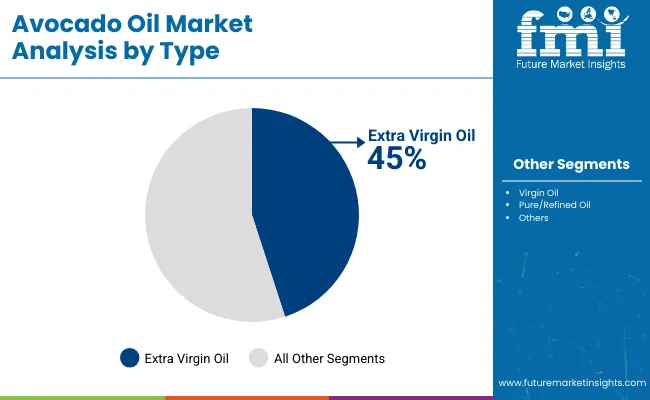
The extra virgin oil segment holds a dominant position with 45% of the market share in the type category, owing to its superior nutritional profile, natural cold-pressing extraction method, and enhanced flavor characteristics. Extra virgin avocado oil is widely used across culinary and cosmetic applications due to its high smoke point, rich monounsaturated fat content, and antioxidant properties that appeal to health-conscious consumers and professional chefs alike.
It enables manufacturers and consumers to deliver premium quality while maintaining nutritional integrity and flavor authenticity in final products. As demand for clean-label, non-GMO, and minimally processed ingredients grows, the extra virgin form continues to gain preference in both gourmet cooking and premium personal care applications.
Manufacturers are investing in advanced cold-pressing technologies, quality control systems, and sustainable sourcing practices to enhance purity, taste, and shelf stability. The segment is poised to expand further as global consumer preferences favor natural, unrefined, and nutrient-dense oil formats.
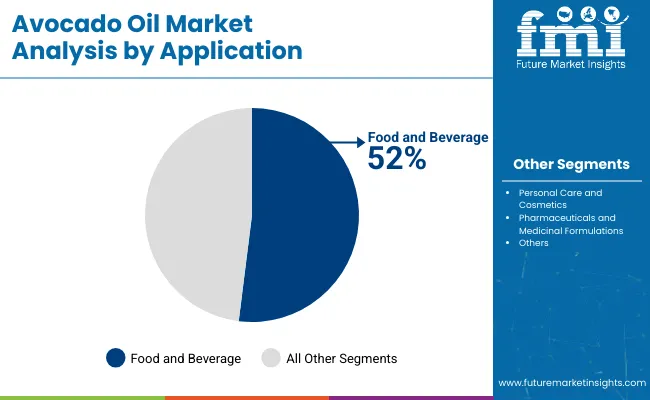
Food and beverage remains a core application segment with 52% of the market share in 2025, as avocado oil enhances nutritional value, cooking performance, and clean-label positioning in culinary preparations, dressings, and functional food products. Its functional versatility supports product innovation in ketogenic-friendly foods, Mediterranean diet formulations, and premium cooking oil blends.
Avocado oil also improves heat stability and flavor profiles in cooking applications, while offering healthy fat content without compromising taste. This makes it indispensable in modern food service and retail environments.
Ongoing demand for health-conscious cooking solutions and the premiumization of edible oils are key trends driving the sustained relevance of avocado oil in this application.
In 2024, global avocado oil consumption grew by 15% year-on-year, with North America taking a 42% share. Applications include premium cooking, cosmetic formulations, and functional food enhancement. Manufacturers are introducing specialized extraction methods and flavored oil variants that deliver superior nutritional profiles and culinary versatility. Cold-pressed formulations now support clean-label positioning. Health-conscious consumption trends and natural ingredient preferences support consumer confidence. Technology providers increasingly supply ready-to-use oil blends with integrated flavor profiles to reduce formulation complexity.
Premium Health Positioning Accelerates Avocado Oil Demand
Food manufacturers and cosmetic companies are choosing avocado oil ingredients to achieve superior monounsaturated fat content, enhance product positioning, and meet consumer demands for natural, nutrient-dense solutions. In nutritional testing, cold-pressed avocado oil delivers up to 70% monounsaturated fats compared to conventional cooking oils at 45-55%.
Products formulated with avocado oil maintain stability throughout high-heat cooking and extended shelf life cycles. In ready-to-use formats, premium oil blends help reduce ingredient complexity while maintaining nutritional integrity by up to 60%. Avocado oil applications are now being deployed for organic certification, increasing adoption in sectors demanding natural fat enhancement. These advantages help explain why avocado oil adoption rates in food service rose 28% in 2024 across North America and Europe.
Production Limitations, Cost Pressures and Geographic Concentration Limit Growth
Market expansion faces constraints due to avocado price volatility, limited processing capacity, and specialized extraction infrastructure needs. Raw avocado costs can vary from USD 1.20 to USD 2.80 per pound depending on seasonal factors and regional supply conditions, impacting oil pricing and leading to supply disruptions of up to 18% in commercial applications.
Cold-pressing technology requirements and quality control standards add 6 to 8 weeks to product development cycles. Specialized storage conditions and premium positioning extend distribution costs by 25-30%compared to conventional cooking oils. Limited availability among cold-pressing facilities restricts scalable production, especially for organic certification projects. These constraints make avocado oil adoption challenging in price-sensitive markets despite growing health benefits and commercial interest.
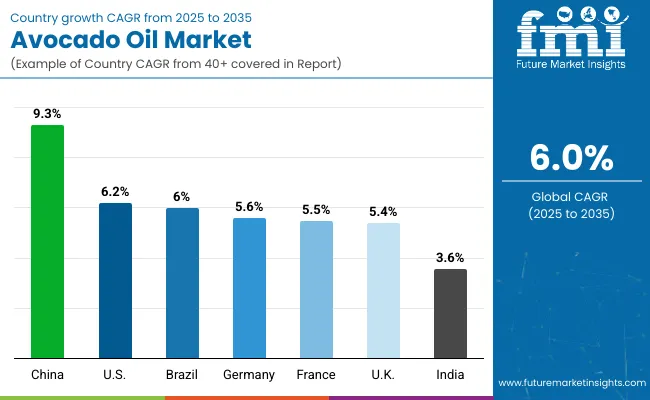
| Countries | CAGR (2025-2035) |
|---|---|
| China | 9.3% |
| USA | 6.2% |
| Brazil | 6.0% |
| Germany | 5.6% |
| France | 5.5% |
| UK | 5.4% |
| India | 3.6% |
In the avocado oil market, China leads with the highest projected CAGR of 9.3% from 2025 to 2035, driven by rapid health consciousness adoption and Western dietary trends. The USA follows with a CAGR of 6.2%, supported by established premium cooking oil demand and clean-label preferences. Brazil shows strong growth at 6.0%, benefiting from regional avocado production advantages.
Germany, France, and the UK demonstrate consistent moderate growth at 5.6%, 5.5%, and 5.4% respectively, supported by organic and gourmet food applications. India, with a CAGR of 3.6%, experiences gradual expansion constrained by price sensitivity but supported by growing health awareness among urban consumers, reflecting regional differences in premium oil adoption patterns.
The report covers an in-depth analysis of 40+ countries; seven top-performing OECD countries are highlighted below.
Revenue from avocado oil in China is projected to grow at a CAGR of 9.3% from 2025 to 2035, significantly exceeding the global average. Growth is fueled by rising health consciousness, Western dietary influences, and premium cooking oil adoption across major urban centers, including Beijing, Shanghai, and Guangzhou. Chinese consumers are increasingly embracing healthy cooking oils as disposable incomes rise and lifestyle diseases become more prevalent. E-commerce platforms and premium retail channels are driving market penetration.
Key Statistics:
The avocado oil market in the USA is anticipated to expand at a CAGR of 6.2% from 2025 to 2035, exceeding the global rate by 0.2%. Growth is centered on health-conscious consumer segments and premium cooking applications in California, Texas, and New York regions. Advanced extraction technologies and organic certifications are being deployed for gourmet cooking, food service, and clean-label applications. FDA regulations and clean-label standards support practical avocado oil application development across diverse culinary markets.
Key Statistics:
Sales of avocado oil in Brazil are slated to flourish at a CAGR of 6.0% from 2025 to 2035, matching the global average. Growth has been concentrated in domestic consumption expansion and export market development in São Paulo, Rio de Janeiro, and Minas Gerais regions. Avocado oil adoption is shifting from limited specialty use toward mainstream cooking applications and cosmetic formulations. Local avocado production advantages and competitive pricing lead commercial deployment strategies. Domestic processing technology partnerships have strengthened, with increased collaboration between Brazilian avocado growers and international oil extraction companies.
Key Statistics:
Demandfor avocado oil in Germany is expected to increase at a CAGR of 5.6% from 2025 to 2035, underperforming the global average by 0.4%. Demand is driven by organic food growth and gourmet cooking applications in Berlin, Munich, and Hamburg markets. Health-conscious consumers and premium food manufacturers are increasingly adopting avocado oil for product differentiation and nutritional positioning. However, high import costs and limited domestic production capacity constrain broader market penetration.
Key Statistics:
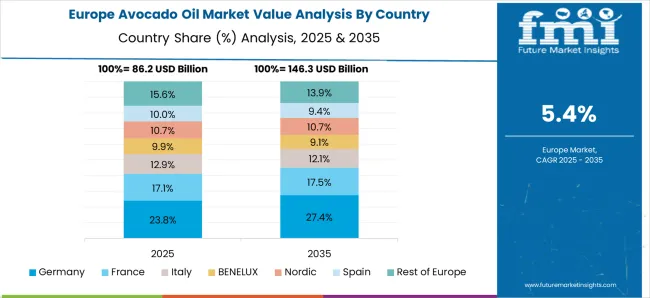
Revenue from avocado oil in France is projected to rise at a CAGR of 5.5% from 2025 to 2035, supported by strong demand for gourmet cooking oils and artisanal food applications. Urban markets like Paris, Lyon, and Marseille are experiencing a shift toward premium cooking ingredients, clean-label formulations, and Mediterranean diet adoption. Domestic food companies are leveraging imported avocado oil to meet quality expectations for haute cuisine and premium-positioned products.
Key Statistics:
The avocado oil market in the UK is expected to grow at a CAGR of 5.4% from 2025 to 2035, slightly below the global average. Growth is driven by health-conscious cooking trends and clean-label food preferences in London, Manchester, and Edinburgh regions. Premium retail channels and organic food stores are expanding avocado oil accessibility, while food manufacturers incorporate it into health-positioned products. Import dependency and Brexit-related supply chain complexities maintain elevated pricing levels. Market development focuses on wellness-oriented consumers and specialty food applications, supported by growing awareness of healthy cooking oil alternatives.
Key Statistics:
Demand for avocado oil in India is projected to expand at a CAGR of 3.6% from 2025 to 2035, below the global average due to price sensitivity and traditional cooking oil preferences. Growth is concentrated in urban metropolitan areas, including Mumbai, Delhi, and Bangalore, where health awareness and disposable incomes are rising. Limited avocado cultivation and high import costs restrict broader market penetration, while consumer education initiatives are gradually building awareness. Premium positioning and health benefit communication are essential for market development, targeting affluent urban consumers.
Key Statistics:
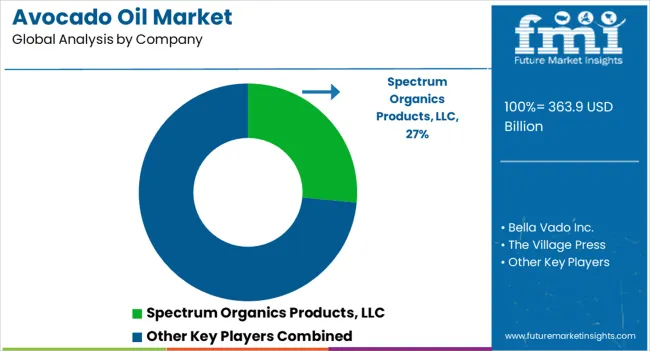
The market is moderately consolidated, featuring a mix of premium specialty oil producers, established organic brands, and regional processors with varying degrees of extraction technology, product innovation, and distribution expertise. Spectrum Organics Products, LLC and La Tourangelle, Inc. lead the premium segment, supplying cold-pressed avocado oils for gourmet cooking, health-conscious consumers, and clean-label food applications. Their strength lies in comprehensive organic certification capabilities, established retail distribution networks, and long-standing relationships with specialty food retailers.
Bella Vado Inc. and The Village Press differentiate through artisanal extraction methods, direct-to-consumer marketing strategies, and application-specific formulations that cater to wellness-focused and culinary enthusiast segments. Sesajal S.A. de C.V. and Grupo Industrial Batellero focus on large-scale production and bulk supply, addressing growing demand from food manufacturers, cosmetic companies, and international export markets.
Regional specialists such as Proteco Gold Pty Ltd., Grove, and Olivado USA emphasize processing innovation, sustainable sourcing practices, and traceability systems, creating value in premium retail markets and specialized cosmetic applications.
Entry barriers remain significant, driven by challenges in cold-pressing technology, avocado supply chain integration, and compliance with organic certification and quality standards across multiple application categories. Competitiveness increasingly depends on extraction efficiency, product differentiation capabilities, and market access expertise for diverse culinary and personal care manufacturing environments.
| Items | Value |
|---|---|
| Quantitative Units (2025) | USD 363.9 million |
| Type | Extra Virgin Oil, Virgin Oil, Pure/Refined Oil, Blend |
| Application | Food and Beverages, Pharmaceuticals and Medicinal Formulations, Personal Care and Cosmetics, Others (Lubricants, Pet Nutrition, and Dietary Supplements) |
| Regions Covered | North America, Latin America, Europe, East Asia, South Asia & Pacific, Middle East & Africa |
| Countries Covered | United States, Canada, United Kingdom, Germany, France, China, Japan, South Korea, Brazil, Australia, India and 40+ countries |
| Key Players | Spectrum Organics Products, LLC, Bella Vado Inc., The Village Press, La Tourangelle , Inc., Proteco Gold Pty Ltd., Sesajal S.A de C.V., Grupo Industrial Batellero , Grove, Cibaria International, Olivado USA |
| Additional Attributes | Dollar sales by type and application; regional demand trends; competitive landscape; consumer preferences for natural/virgin versus refined or blended oils; integration with sustainable, traceable avocado sourcing; innovations in extraction and refining technologies and purity grading; and quality standardization across culinary, cosmetic, and industrial applications |
The global avocado oil market is estimated to be valued at USD 363.9 billion in 2025.
The market size for the avocado oil market is projected to reach USD 651.7 billion by 2035.
The avocado oil market is expected to grow at a 6.0% CAGR between 2025 and 2035.
The key product types in avocado oil market are extra virgin oil, virgin oil, pure/refined oil and blend.
In terms of application, food and beverages segment to command 48.7% share in the avocado oil market in 2025.






Our Research Products

The "Full Research Suite" delivers actionable market intel, deep dives on markets or technologies, so clients act faster, cut risk, and unlock growth.

The Leaderboard benchmarks and ranks top vendors, classifying them as Established Leaders, Leading Challengers, or Disruptors & Challengers.

Locates where complements amplify value and substitutes erode it, forecasting net impact by horizon

We deliver granular, decision-grade intel: market sizing, 5-year forecasts, pricing, adoption, usage, revenue, and operational KPIs—plus competitor tracking, regulation, and value chains—across 60 countries broadly.

Spot the shifts before they hit your P&L. We track inflection points, adoption curves, pricing moves, and ecosystem plays to show where demand is heading, why it is changing, and what to do next across high-growth markets and disruptive tech

Real-time reads of user behavior. We track shifting priorities, perceptions of today’s and next-gen services, and provider experience, then pace how fast tech moves from trial to adoption, blending buyer, consumer, and channel inputs with social signals (#WhySwitch, #UX).

Partner with our analyst team to build a custom report designed around your business priorities. From analysing market trends to assessing competitors or crafting bespoke datasets, we tailor insights to your needs.
Supplier Intelligence
Discovery & Profiling
Capacity & Footprint
Performance & Risk
Compliance & Governance
Commercial Readiness
Who Supplies Whom
Scorecards & Shortlists
Playbooks & Docs
Category Intelligence
Definition & Scope
Demand & Use Cases
Cost Drivers
Market Structure
Supply Chain Map
Trade & Policy
Operating Norms
Deliverables
Buyer Intelligence
Account Basics
Spend & Scope
Procurement Model
Vendor Requirements
Terms & Policies
Entry Strategy
Pain Points & Triggers
Outputs
Pricing Analysis
Benchmarks
Trends
Should-Cost
Indexation
Landed Cost
Commercial Terms
Deliverables
Brand Analysis
Positioning & Value Prop
Share & Presence
Customer Evidence
Go-to-Market
Digital & Reputation
Compliance & Trust
KPIs & Gaps
Outputs
Full Research Suite comprises of:
Market outlook & trends analysis
Interviews & case studies
Strategic recommendations
Vendor profiles & capabilities analysis
5-year forecasts
8 regions and 60+ country-level data splits
Market segment data splits
12 months of continuous data updates
DELIVERED AS:
PDF EXCEL ONLINE
Korea Avocado Oil Market Analysis - Size, Share & Trends 2025 to 2035
Japan Avocado Oil Market Analysis - Size, Share & Trends 2025 to 2035
Demand and Trend Analysis of Avocado Oil in Western europe Size and Share Forecast Outlook 2025 to 2035
Oily Waste Can Market Size and Share Forecast Outlook 2025 to 2035
Oil and Gas Seal Market Size and Share Forecast Outlook 2025 to 2035
Oil Coalescing Filter Market Size and Share Forecast Outlook 2025 to 2035
Oil-immersed Iron Core Series Reactor Market Size and Share Forecast Outlook 2025 to 2035
Oil and Gas Sensor Market Forecast Outlook 2025 to 2035
Oil Packing Machine Market Forecast and Outlook 2025 to 2035
Oil and Gas Pipeline Coating Market Forecast and Outlook 2025 to 2035
Oilfield Scale Inhibitor Market Size and Share Forecast Outlook 2025 to 2035
Oil-in-Water Anionic Emulsifier Market Size and Share Forecast Outlook 2025 to 2035
Oil and Gas Field Services Market Size and Share Forecast Outlook 2025 to 2035
Oil Control Shampoo Market Size and Share Forecast Outlook 2025 to 2035
Oil Expellers Market Size and Share Forecast Outlook 2025 to 2035
Oilfield Stimulation Chemicals Market Size and Share Forecast Outlook 2025 to 2035
Oiler Kits Market Size and Share Forecast Outlook 2025 to 2035
Oil Pressure Sensor Market Size and Share Forecast Outlook 2025 to 2035
Oil Filled Power Transformer Market Size and Share Forecast Outlook 2025 to 2035
Oily Skin Control Products Market Analysis - Size and Share Forecast Outlook 2025 to 2035

Thank you!
You will receive an email from our Business Development Manager. Please be sure to check your SPAM/JUNK folder too.
Chat With
MaRIA